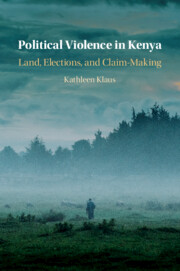Book contents
- Political Violence in Kenya
- Political Violence in Kenya
- Copyright page
- Dedication
- Contents
- Figures
- Maps
- Tables
- Acknowledgments
- Abbreviations
- 1 Introduction
- 2 A Theory of Land and Electoral Violence
- 3 Historical Origins of Electoral Violence
- Part I Determinants of Contentious Land Narratives
- Part II Determinants of Election Violence
- Part III Consequences of Electoral Violence
- Book part
- References
- Index
1 - Introduction
Published online by Cambridge University Press: 14 May 2020
- Political Violence in Kenya
- Political Violence in Kenya
- Copyright page
- Dedication
- Contents
- Figures
- Maps
- Tables
- Acknowledgments
- Abbreviations
- 1 Introduction
- 2 A Theory of Land and Electoral Violence
- 3 Historical Origins of Electoral Violence
- Part I Determinants of Contentious Land Narratives
- Part II Determinants of Election Violence
- Part III Consequences of Electoral Violence
- Book part
- References
- Index
Summary
Chapter 1, the introduction, begins by motivating the puzzle of election violence, asking why election violence escalates in one local context, but not another seemingly similar context. In contrast to existing accounts that emphasize institutional features of the state or the strategic incentives of political elites, the chapter introduces the book’s main argument: that the occurrence of violence is a joint production between political elites and ordinary citizens. In outlining this argument, the chapter introduces the book’s theory of land narratives and their role in the production and process of electoral violence, arguing that land narratives can serve as a key device around which elites and citizens coordinate the use of violence. The chapter then summarizes the book’s methodology, reviews existing explanations of electoral violence, and provides an outline of the book.
- Type
- Chapter
- Information
- Political Violence in KenyaLand, Elections, and Claim-Making, pp. 1 - 33Publisher: Cambridge University PressPrint publication year: 2020

